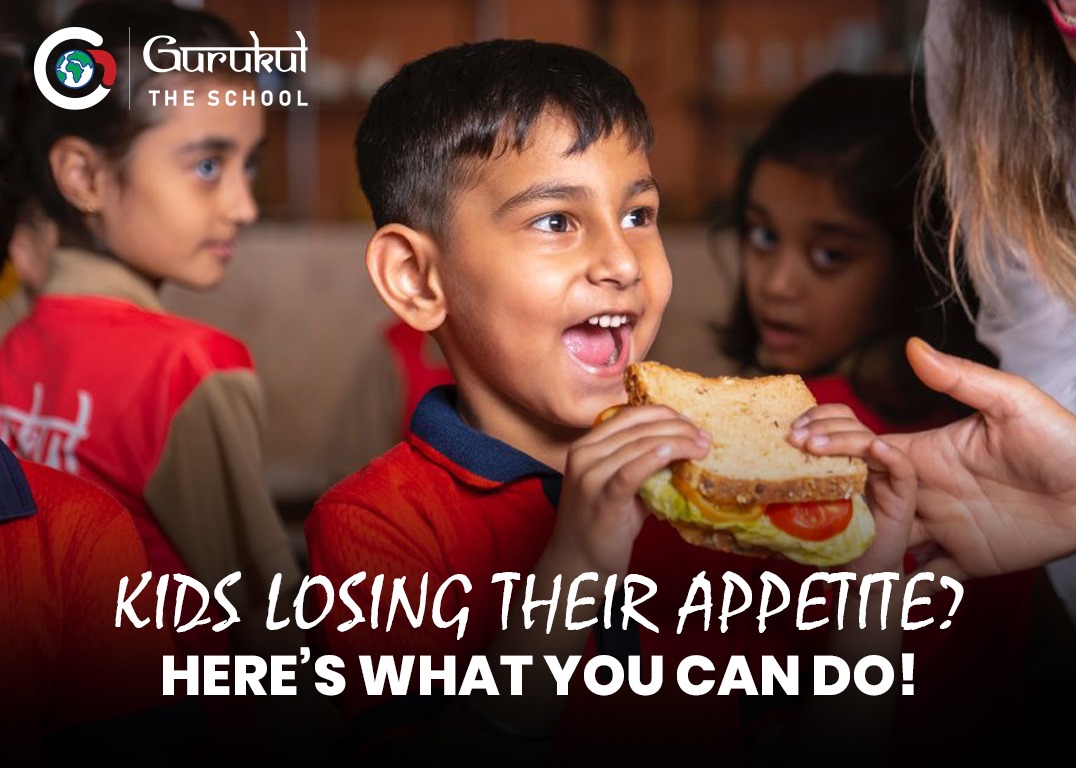Kids Losing Their Appetite? Here’s What You Can Do!
posted on May 02, 2024
We at Gurukul The School always recommend parents to include children in the meal preparation stage because it will make kids feel more invested in the entire process

Mealtime battles are challenging for parents, especially when their kids refuse to eat food on most days. While occasional reluctance to eat food isn’t alarming, parents must become cautious if it becomes their kid’s daily habit. We at Gurukul The School, a top rating school in Ghaziabad, believe factors like illness, stress, medications, major life transition phases, picky eating habits, etc., may be the common reasons behind the lost appetite of kids.
If your child’s normal growth isn’t affected and their overall well-being seems on-point, parents can address the problem by implementing actionable tips. To help you with the same, we are sharing in this blog post today a few simple ways to support your child’s appetite at home. Try them out!
- Create a Pleasant Mealtime Environment
Kids adore being showered with love, affection, and attention. So, whenever you notice your kids eating less, focus on creating a pleasant mealtime experience for the next meal. Create a calm and positive environment by keeping all sorts of distraction away while eating.
As everyone sits together for the meal, strike up interesting conversations, share age-appropriate jokes with kids, and make them interact more, transforming it into a family bonding experience. It will make the kids feel relaxed and happy, and they may eat more just to continue experiencing these happy moments a little longer.
- Focus More on Presentation
Sometimes, kids can be hard to understand. They may devour a certain dish within minutes on most days and refuse even to taste it on other days. Such experiences can make it difficult for parents to fulfill their child’s nutritional needs. According to Gurukul The School, the best way to tackle this challenge is by incorporating visually pleasing presentations into everyday meals.
For example, if you are serving sandwiches or pancakes for breakfast to your kids, consider using cookie cutters of fun shapes to give them an entirely different appearance. It may intrigue kids into eating the food, even if they show reluctance earlier. Similarly, you can replace ordinary tiffin with bento boxes with multiple compartments. Add differently colored food items with different textures so the visual palette makes them eat the entire lunch.
- Offer Healthy and Delicious Choices
If you’ve tried multiple ways to make your kids eat food and nothing worked, try offering them more alternatives. Kids are unpredictable, and their picky eating habits may prevent them from eating the same food frequently. We recommend analyzing the previous week’s menu to identify what can be changed without affecting their daily dietary profile.
You can also include your kids in the process of creating a menu with their favorite items. If your kids are too young, ask them to choose between pureed soup and porridge. Older kids can choose between healthy wraps and burgers made with whole wheat flour buns. Letting your kids choose their meals gives them a sense of autonomy, eventually motivating them to eat wholeheartedly. Over time, you would notice that they have resumed eating consistently, with no signs of a lost appetite.
- Involve Them in Meal Preparations
We at Gurukul The School always recommend parents to include children in the meal preparation stage because it will make kids feel more invested in the entire process, and they may start eagerly waiting for the food solely because of their participation. Since there are various stages of meal preparation, we recommend including kids in age-appropriate activities. If your kids are too young, take them to grocery stores and let them pick the vegetables or other items they want to eat.
Slightly older kids can be asked to wash vegetables, stir ingredients in a pot (under supervision), place cheese slices on sandwiches, arrange utensils on the dinner table, etc. The aim is to keep them actively engaged in the process so they feel excited to eat the food. Such participation helps kids experience a sense of accomplishment and pride. This feeling can alone nudge them to eat, even if they were earlier not interested. However, keep the child’s safety in mind while including them in the meal preparations.
Conclusion
We at Gurukul The School, a top rating school in Ghaziabad, understand that seeing children lose their appetite can be worrying for all parents, but it’s crucial to understand that occasional fluctuations are normal. Appetite keeps changing with age and is also influenced by the kid’s activity levels. The only way to ensure the child’s healthy well-being is by being aware of the various factors that may trigger a loss of appetite and when to take action.
If your kid’s sudden loss of appetite is accompanied by unexplainable weight gain/loss, illness, chronic fatigue, etc., consult a doctor for personalized health guidance. Likewise, if your child shows reluctance to eat food for an extended period, say more than a week, and its effects start showing on their physical, mental, and emotional well-being, we recommend consulting a doctor for prompt medical intervention. However, if the loss of appetite is occasional and you want to fix it early, implement the tips discussed in this blog post, and you will definitely see your kid’s appetite building up with time.